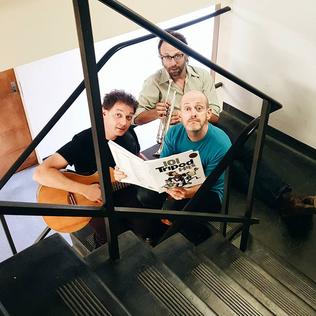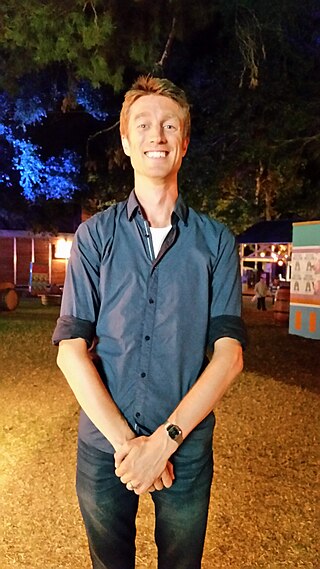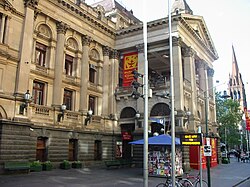
John Barry Humphries was an Australian comedian, actor, author and satirist. He was best known for writing and playing his stage and television characters Dame Edna Everage and Sir Les Patterson. Humphries's characters brought him international renown. He appeared in numerous stage productions, films and television shows. Originally conceived as a dowdy Moonee Ponds housewife who caricatured Australian suburban complacency and insularity, the Dame Edna Everage character developed into a satire of stardom – a gaudily dressed, acid-tongued, egomaniacal, internationally fêted "housewife gigastar".

Just for Laughs is a comedy festival, currently in limbo, that was held each July in Montreal, Quebec, Canada. Founded in 1983, it was the largest international comedy festival in the world. In addition to the festivals themselves, Just for Laughs also develops, produces, and distributes other forms of comedy entertainment, such as television programming.
William James Anderson is an Australian comedian, writer, presenter, and podcaster.

Tripod are an Australian musical comedy trio founded by Scod, Yon and Gatesy in 1996. They provide original songs and harmonies, strung together by comic banter.

Danny Bhoy is a Scottish comedian who has performed in the United Kingdom, New Zealand, Australia, Canada, Sweden, and the United States.

Charlie Pickering is an Australian comedian, television and radio presenter, author and producer.
John Pinder was a New Zealand-born Australian comedy producer and festival director who produced band performances, ran live venues and co-founded three Australian comedy festivals, including Melbourne International Comedy Festival and Circus Oz.

Sam Simmons is an Australian comedian and radio and TV presenter.

Felicity Ward is an Australian comedian, best known for her TV appearances on Spicks and Specks, Thank God You're Here, Good News Week and as a writer/performer in the Channel 10 Network television programme The Ronnie Johns Half Hour. She is a part of The 3rd Degree, who made and starred in The Ronnie Johns Half Hour.

Samuel Jonathan McMillan is an Australian musical comedian, satirist, writer and radio presenter who performs under the stage name Sammy J. He embraces a variety of media in his comedy, including the use of video and self-composed music, and frequently collaborates with fellow Australian puppet comedian Randy Feltface. He has released several CDs and DVD compilations of his work; most recently the album Symphony in J Minor which was nominated for Best Comedy Release at the 2019 ARIA Awards. He has performed at comedy festivals in Australia, Edinburgh and Montreal, and has appeared on various Australian television shows, including Sammy J & Randy in Ricketts Lane, a sitcom based on the duo's touring show of the same name. He currently produces a weekly political sketch for ABC Television, satirising the news through various characters, and is the Breakfast presenter on ABC Radio Melbourne.
Justin Hamilton is an Australian comedian, writer and radio host.

Geraldine Mary Quinn is a songwriter, guitarist, singer, comedian and actor based in Melbourne, Australia. She won the Best Emerging Cabaret Artiste award at the 2006 Green Room Awards (Australia), and was nominated for Original Songs.
Dave Thornton is an Australian stand-up comedian, actor, television and radio presenter. He has performed stand-up comedy throughout Australia, in Edinburgh, Singapore and New York. He has also appeared on Australian television and radio.
DeAnne Smith is a Canadian-American comedian, writer and columnist. They first gained notice as a comedian in 2008 touring their debut full-length solo stand-up show to popular and critical acclaim, culminating in winning the Sydney Comedy Festival's Time Out Best Newcomer Award and a nomination for Best Newcomer in the 2008 Canadian Comedy Awards. Smith has since continued to tour internationally, with shows proving to be both commercial and critical successes. Their shows have seen them nominated for numerous awards, including the Melbourne Comedy Festival's prestigious Barry Award in 2011 and being consistently rated amongst Montreal's Top 10 comedians. In addition to their live solo shows, Smith is also known for appearances on television and radio, most notably on Australia's Good News Week on the Channel 10 network and HBO series Funny As Hell.

Australian comedy refers to the comedy and humour performed in or about Australia or by the people of Australia. Australian humour can be traced to various origins, and today is manifested in a diversity of cultural practices and pursuits. Writers like Henry Lawson and Banjo Paterson helped to establish a tradition of laconic, ironic and irreverent wit in Australian literature, while Australian politicians and cultural stereotypes have each proved rich sources of comedy for artists from poet C. J. Dennis to satirist Barry Humphries to iconic film maker Paul Hogan, each of whom have given wide circulation to Australian slang.
Ciaran Lyons is an Australian stand up comedian, television and radio presenter. He is best known for his work as a presenter on national radio network triple j as well as his television appearances on The Project, Talkin' 'Bout Your Generation and the latest series of SBS Filthy Rich and Homeless.
Anne Elizabeth Gabrielle Edmonds is an Australian comedian and actor best known for her stand-up work and for creating and starring in the ABC comedy series The Edge of the Bush. Beginning her career in comedy at 29 (2010) after working in mental health in rural Australia, Edmonds uses her suburban background, singing/songwriting and storytelling to create a fearless, self-deprecating and often macabre stand up voice. Humiliation and despair are central themes to Edmonds' comedy, as are stories of teenage mischief, sex, failure, relationships and loneliness.
Neel Kolhatkar is an Australian comedian, YouTuber and actor. As of April 2022, Kolhatkar has received 86.5 million views on his YouTube channel.
Greg Larsen is an actor, television writer, and comedian from Melbourne, Australia. He is best known for his work portraying Ethan Krum in the BBC One drama thriller series The Tourist; cast member and correspondent in the ABC news comedy show Tonightly with Tom Ballard ; and as writer and cast member of the sketch comedy series At Home Alone Together and We Interrupt This Broadcast on Seven Network.
Nath Valvo is an Australian stand-up comedian, screenwriter, and actor in TV and movie roles. Valvo's comedic style often revolves around personal anecdotes, social commentary, and pop culture references.










